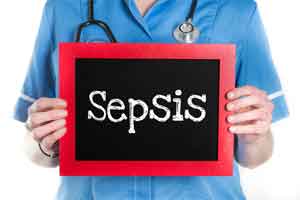- Home
- Editorial
- News
- Practice Guidelines
- Anesthesiology Guidelines
- Cancer Guidelines
- Cardiac Sciences Guidelines
- Critical Care Guidelines
- Dentistry Guidelines
- Dermatology Guidelines
- Diabetes and Endo Guidelines
- Diagnostics Guidelines
- ENT Guidelines
- Featured Practice Guidelines
- Gastroenterology Guidelines
- Geriatrics Guidelines
- Medicine Guidelines
- Nephrology Guidelines
- Neurosciences Guidelines
- Obs and Gynae Guidelines
- Ophthalmology Guidelines
- Orthopaedics Guidelines
- Paediatrics Guidelines
- Psychiatry Guidelines
- Pulmonology Guidelines
- Radiology Guidelines
- Surgery Guidelines
- Urology Guidelines
Manage critical first hour of Sepsis on war footing-SSC Update

The 2018 update of the Surviving Sepsis Campaign (SSC) appearing in Journal Critical Care Medicine emphasizes on immediate treatment of Sepsis for improving the chances of survival. It is a serious infection causing widespread inflammation and keeping this in mind "Hour-1 Bundle" of the international, evidence-based guidelines for its treatment have been introduced in Surviving Sepsis Campaign. The underlying message is to manage the critical first hour of Sepsis on War footing.
The latest SSC focuses on five treatment steps that healthcare professionals should initiate within the first hour after recognizing sepsis. "Like multiple trauma, heart attack, or stroke, sepsis is a medical emergency," comments Mitchell M. Levy, MD, MCCM, of Brown University School of Medicine, lead author of the latest SSC update. "Our revised Hour-1 Bundle reflects the clinical reality at the bedside of seriously ill patients with sepsis or septic shock--with the explicit intention of beginning resuscitation and management immediately."
Reflecting the latest evidence, the Hour-1 Bundle highlights five steps that healthcare professionals should begin as soon as sepsis is recognized:
- Measure the blood lactate level. A high lactate level may indicate that the tissues are not getting enough oxygen from the blood and may identify a patient at higher risk of further deterioration.
- Perform blood cultures to identify the cause of the infection. Blood samples should be taken before antibiotics are administered, if possible.
- Administer broad-spectrum antibiotics that are active against the causative organism.
- Start intravenous fluids. Fluid resuscitation is an essential step to stabilize the patient's condition.
- Administer vasopressors to raise blood pressure. This is a critical resuscitation step in patients with septic shock.
"There is no reason to delay treatment for patients with sepsis and septic shock," Dr. Levy comments. "Recognizing the urgent need to treatment, clinicians must (and many already do) begin treatment immediately, rather than waiting for 3 or 6 hours in these critically ill patients."
Sepsis is a common and potentially life-threatening condition, occurring when the immune system mounts an overwhelming inflammatory response to infection in the blood or elsewhere in the body. Septic shock occurs when sepsis leads to a sharp drop in blood pressure and other metabolic abnormalities, with a risk of progression to organ failure.
Dr. Levy and coauthors emphasize that the Hour-1 Bundle should be implemented in emergency departments, intensive care units, and throughout the hospital "as the next iteration of ever-improving tools in the care of patients with sepsis and septic shock as we all work to lessen the global burden of sepsis."
The SSC is a global cooperative effort to improve treatment of sepsis and reduce its associated high mortality rate. The first SSC treatment bundle was introduced in 2004, followed by frequent updates in response to new evidence.
For more details click on the link: doi: 10.1097/CCM.0000000000003119

Disclaimer: This site is primarily intended for healthcare professionals. Any content/information on this website does not replace the advice of medical and/or health professionals and should not be construed as medical/diagnostic advice/endorsement or prescription. Use of this site is subject to our terms of use, privacy policy, advertisement policy. © 2020 Minerva Medical Treatment Pvt Ltd